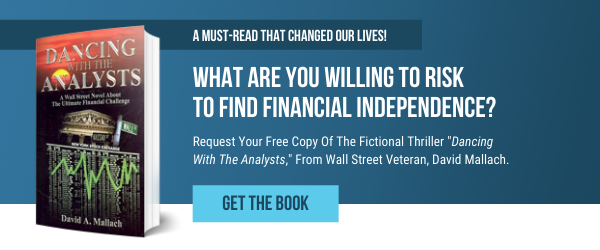I was fortunate to be near the water for a period of time this past summer. I like to be out in the water, but by no means am I comfortable being out in the middle of the ocean. I know my strengths, and boating isn’t one of them.
You will not catch me going all by myself in a boat. I'm not experienced, I'm not trained, and I know that I have no control. When it comes to boating, I'm either going to hire somebody to take me out on the water, or I'm not going to take chances to go very far, and I’m definitely not venturing out if I see some sort of storm coming.
Financial Professionals and the Illusion of Certainty
One can draw many parallels between the ocean and the financial markets. I routinely observe financial professionals who treat the markets like their ocean. They go out in the water during perhaps a stormy period, thinking that they have some element of control over Mother Nature. But they don’t. And they take chances they shouldn’t. With your money, no less.
Especially when it comes to investing, people crave certainty. Can you blame them? And most advisors, because they too are human beings, want to give their clients certainty. They ignore what they probably know deep down, what they would admit if they were being totally honest with themselves, namely that they cannot offer an ounce of certainty.
But in order to “do their jobs,” they instead position an offer that creates the illusion of certainty. What is the illusion of certainty? It’s looking at an investment manager’s track record, or a specific fund’s historical performance, as a benchmark for determining its capacity to produce similar results in the future.
I’m not saying that these advisors intend to deceive the client, that wouldn’t be fair, nor would it be true. Most of them just don’t know better because the traditional investment world has only taught them the illusion. What’s worse, is that for the client-advisor relationship to even exist, both parties have to buy into the illusion of control.
This complicity at some level, the agreement between advisor and client to buy into the illusion of control, reminds me of my mentor in the business, David. He says: "Once you give up the notion of being able to control the markets and start working with the markets, rather than try to control them, you can actually have a lot of success." There is so much wisdom in this statement.
Profitable Investing Is Not Predicated on Historical Performance
Have you noticed the inordinate amount of time many advisors spend talking about what's happened in the past in order to point toward where you should invest? As if those historical numbers held some sort of key to how you are going to perform going forward.
It’s a distortion.
The only determinant of what happens in your portfolio is not what happened yesterday, but what is going to happen tomorrow. That's it. Coca-Cola, for example, could have raised its dividend payment every year for the past 15 years. That has no bearing on what's going to happen over the next three months or six months or five years.
I've seen great-performing funds slide from the top of the list to the very bottom. I've seen some of the worst-performing funds turn around and all of a sudden become high-performing funds. You may remember Bill Miller, the Legg Mason Capital Management Value Trust mutual fund manager. When I got into the business, he was an absolute legend. He had beaten the S&P, I think for 15 straight years, every single year from 1991 to 2005.
Then one year Miller lost 72% of the value of the fund. Now that was also 2008, and a dark time for the financial markets as a whole. But say it was 2007, and you had no idea about the great crash that was coming. If you were using historical data, wouldn’t you invest in Miller’s fund in 2007 with confidence? You may very well have.
Back to reality: 2008 did indeed happen. Over the subsequent few years, Miller underperformed the S&P by a pretty significant amount. Let’s now flash forward to those “bad” years, and say you’re an investor who is thinking “Well, this guy really is underperforming…I ought to take my money elsewhere.” You pick up and leave.
Guess what? I’m sorry to break it to you, but the guy recovers! And despite the dip in his performance, if you took the long view, over the total time he managed the fund, he outperformed the S&P 500. Who could have predicted any of this? Asked about his winning “streak,” Miller is reported to have said: “We were lucky.” He eventually stepped down from Legg Mason, and that was the end of his high-flying days.
Understand the Process Guiding Your Investment Strategy
If you indeed believe that there is no predictability in historical performance, what does that leave you with? The other side of this equation is that you don’t know what’s going to happen in the future, either.
Imagine walking onto a plane that’s about to make a cross-country trip and asking the captain what the weather is going to be along the flight path. How would you feel if the captain said: "Well, last week, from Boston to LA, we had fantastic weather." And you say, "Well, that's fine, but what's the weather like today? Because we're flying today." And what you hear in return is, "Let me show you a chart of the last six months of all the weather patterns that we've flown through leading up to today on the same route." And you're like, "Okay, fine. But I'm not flying last week, I'm flying right now. I want to know if we're going to be in any danger." Exactly.
So if there is no reliance on past performance, and there’s no way to predict the future, the best thing that we can come up with as investors is: “Do I understand the process that the fund manager is putting forth for me today, regardless of past performance?” And does that process make sense for me? Do I think that will help me outperform over time?
As advisors and fund managers, we have to have the humility to admit that we are not Wayne Gretzky skating to where the puck is going to be. We also have to have the courage to meet reality with a sense of enterprise, and a desire to leverage whatever opportunity it presents. You can let a storm scare you into hiding, or you can let it sink you, or you can permit the wind to fill your sail. There’s always a choice.
Choosing a Financial Advisor to Captain Your Investment Journey
While you may not find me in the actual ocean on a boat, I do have experience in the ocean of investing. And I’ve taken my mentor’s words to heart, never to believe that I have any control over where the market is going.
Instead, I look at the ocean and work with whatever is here, whether it’s a storm, mellow waves, or a completely flat sea – I use every bit of information available to me in the now to make the best decisions I can, knowing that when conditions change (the only guarantee I will give you is that they will), I reserve the right to adjust course as I navigate on behalf of all the clients who have put their trust in our process.
It is so simple, yet it bears repeating. At Beck Bode, we have a proven and transparent process: we assess all the information we have in the present to make the best decisions we can for this moment in time. We are flexible and adapt our ongoing moves as the information at hand changes. The only thing that doesn’t change is our process.
Learn more about Beck Bode’s investment management services.
Ben Beck is Managing Partner & Chief Investment Officer at Beck Bode, a deliberately different wealth management firm with a unique view on investing, business and life.

 Benjamin Beck, CFP®
Benjamin Beck, CFP®